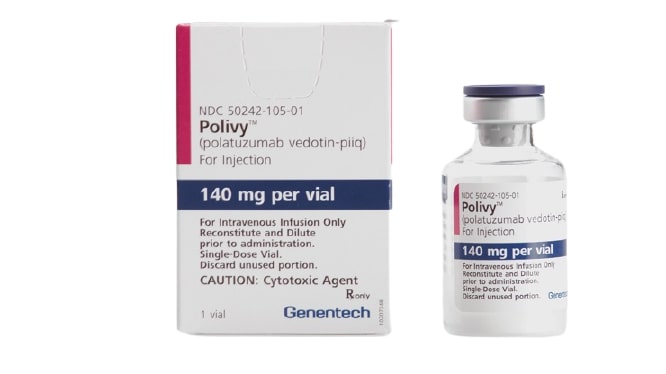Keytruda (pembrolizumab) vs Polivy (polatuzumab vedotin-piiq)
Keytruda (pembrolizumab) vs Polivy (polatuzumab vedotin-piiq)
When comparing Keytruda (pembrolizumab) with Polivy (polatuzumab vedotin-piiq), it is important to consider their mechanisms of action and indications. Keytruda is a PD-1 blocking antibody used in various cancers, including melanoma, non-small cell lung cancer, and head and neck cancers, and works by enhancing the body's immune response against cancer cells. On the other hand, Polivy is an antibody-drug conjugate used specifically for the treatment of relapsed or refractory diffuse large B-cell lymphoma and targets cancer cells by delivering a cytotoxic agent directly to them. The choice between these two medications would depend on the specific type and stage of cancer being treated, as well as the patient's overall health and treatment history.
Difference between Keytruda and Polivy
| Metric | Keytruda (pembrolizumab) | Polivy (polatuzumab vedotin-piiq) |
|---|---|---|
| Generic name | Pembrolizumab | Polatuzumab vedotin-piiq |
| Indications | Various types of cancer, including melanoma, lung cancer, head and neck cancer, Hodgkin lymphoma, and others | Relapsed or refractory diffuse large B-cell lymphoma (DLBCL) |
| Mechanism of action | Programmed death receptor-1 (PD-1) blocking antibody | Antibody-drug conjugate targeting CD79b |
| Brand names | Keytruda | Polivy |
| Administrative route | Injection (intravenous) | Injection (intravenous) |
| Side effects | Fatigue, musculoskeletal pain, decreased appetite, itching, diarrhea, nausea, rash, fever, cough, dyspnea, constipation, pain, and abdominal pain | Neutropenia, thrombocytopenia, anemia, peripheral neuropathy, fatigue, diarrhea, fever, decreased appetite, and pneumonia |
| Contraindications | Severe hypersensitivity to pembrolizumab or any of its excipients | Severe hypersensitivity to polatuzumab vedotin-piiq or any of its excipients |
| Drug class | Anti-PD-1 monoclonal antibody | Antibody-drug conjugate |
| Manufacturer | Merck & Co. | Genentech, Inc. |
Efficacy
Overview of Keytruda (Pembrolizumab) in Lymphoma Treatment
Keytruda (pembrolizumab) is a monoclonal antibody that has shown efficacy in the treatment of various forms of cancer, including lymphoma. Specifically, it has been used to treat Hodgkin lymphoma after the failure of other treatments. Pembrolizumab works by targeting the PD-1 receptor on T cells, effectively blocking the PD-1 pathway. This action prevents cancer cells from evading immune detection, thereby allowing the immune system to recognize and destroy them. Clinical trials have demonstrated that pembrolizumab can induce responses in a significant proportion of patients with relapsed or refractory Hodgkin lymphoma, although the response rates and duration of response can vary among individuals.
Efficacy of Keytruda in Clinical Studies
In clinical studies, Keytruda has shown promise in patients with relapsed or refractory classical Hodgkin lymphoma. Results from the KEYNOTE-087 trial, which is a multicohort, single-arm study, revealed an overall response rate (ORR) of approximately 69%, with a complete remission rate of 22.4% in patients treated with pembrolizumab. These findings suggest that Keytruda can be an effective treatment option for patients who have exhausted other therapies, although it is important to note that responses can vary and not all patients will achieve remission.
Overview of Polivy (Polatuzumab Vedotin-piiq) in Lymphoma Treatment
Polivy (polatuzumab vedotin-piiq) is an antibody-drug conjugate specifically targeting CD79b, a protein expressed on the surface of B cells, and is used in the treatment of certain types of non-Hodgkin lymphoma (NHL). It is often used in combination with other chemotherapeutic agents, such as bendamustine and a rituximab product (BR), for the treatment of diffuse large B-cell lymphoma (DLBCL) after at least two prior therapies have failed. This combination has been shown to improve outcomes in patients with relapsed or refractory DLBCL, offering a new line of therapy for a condition that is challenging to treat.
Efficacy of Polivy in Clinical Studies
The efficacy of Polivy was evaluated in a pivotal phase Ib/II clinical trial, which demonstrated that the combination of polatuzumab vedotin with BR improved median overall survival (OS) and progression-free survival (PFS) compared to BR alone in patients with relapsed or refractory DLBCL. Specifically, the study showed a median OS of 12.4 months for patients treated with the Polivy combination versus 4.7 months for those receiving BR alone. The ORR was also higher in the Polivy combination group, with 40% of patients achieving a complete response. These results highlight Polivy's potential as an effective treatment option for patients with difficult-to-treat DLBCL, though individual responses can vary and long-term outcomes are still being studied.
Regulatory Agency Approvals
Keytruda
-
European Medical Agency (EMA), European Union

-
Food and Drug Administration (FDA), USA

-
Health Canada

-
Therapeutic Goods Administration (TGA), Australia

-
Medsafe (NZ)

Polivy
-
Food and Drug Administration (FDA), USA

-
Pharmaceuticals and Medical Devices Agency (PMDA), Japan

-
Therapeutic Goods Administration (TGA), Australia

Access Keytruda or Polivy today
If Keytruda or Polivy are not approved or available in your country (e.g. due to supply issues), you can access them via Everyone.org.
How it works

Make an enquiry
Choose the medicine you want to buy, answer a couple of questions, and upload your prescription to speed things up. We’ll get back to you within 24 hours.


Make an enquiry
Choose the medicine you want to buy, answer a couple of questions, and upload your prescription to speed things up. We’ll get back to you within 24 hours.


Breeze through the paperwork
We'll guide you through the required documents for importing unapproved medicine, ensuring you have all the necessary information.


Get a personalized quote
We’ll prepare a quote for you, including medicine costs and any shipping, administrative, or import fees that may apply.


Receive your medicine
Accept the quote and we’ll handle the rest - sourcing and safely delivering your medicine.

Some text on this page has been automatically generated. Speak to your physician before you start a new treatment or medication.
Let's talk
If you have any questions, call us or send us a message through WhatsApp or email:
Contact us




